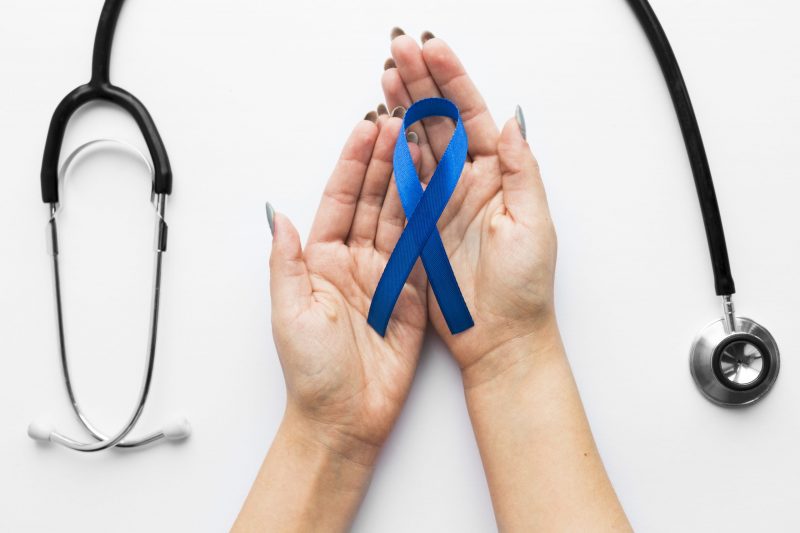As with most parts of the body, we tend to offer our colons little of our attention until there is a problem. Our colons play a major role in our daily functioning, and yet they are sorely neglected. If you think you are too young to get colon cancer, or that it is impossible to treat it, then you should consider brushing up on your facts. Keeping reading and don’t let colon cancer take you by surprise.
Perhaps, taking the mystery out of your colon may help you feel more comfortable talking about this ?hard-working? part of your body with your doctor. It may also help you to identify the signs when something is wrong with it.
March is known as the month of ?colon cancer awareness?. What better time than now, to get reacquainted with this 5-feet long organ? Did you know that the five-year survival rate of colorectal cancer in India is one of the lowest in the world, at less than 40%? Lack of awareness, inadequate access to healthcare, socioeconomic factors and many others, contribute to this high percentage. Let?s aim at increasing this percentage, by staying aware of the signs and symptoms.
Colorectal Cancer:
Colorectal cancer is a cancer that starts in the large intestine or rectum. These organs are in the lower part of the stomach. The rectum is situated at the end of colon. Doctors usually use staging as a guide to understand how far along the cancer is. It’s absolutely crucial for your doctor to know the stage of the cancer so they can chart out the best treatment plan for you.
Stages of colorectal cancer:
Stage 0: This is the earliest stage, also known as carcinoma in situ. In this stage abnormal cells are present only in the inner lining of the colon or rectum.
Stage 1: The cancer has penetrated the lining of the colon or the rectum and may have passed into the muscle layer. It has not spread to nearby lymph nodes or to the other parts of the body.
Stage 2: The cancer has proliferated to the walls of the colon or rectum, or through the walls to the surrounding tissues but hasn?t affected the lymph nodes.
Stage 3: The cancer has moved to lymph nodes but not to other body parts.
Stage 4: This is the advanced stage, where the cancer has spread to other distant organs, such as the liver or lungs.
Signs and symptoms of colorectal cancer:
In the early stages Colorectal cancer may not show any symptoms. If you do experience symptoms in the early stages, they may include the following:
- Abdominal cramps
- Abdominal pain
- Constipation
- Diarrhea
- Changes in stool color
- Changes in stool shape
- Blood in the stool
- Bleeding from the rectum
- Excessive gas
Some of the symptoms that are noticeable in the later stages (3rd or 4th) include:
- Excessive fatigue
- Unexplained weakness
- Unintentional weight loss
- Changes in the stools that last longer than a month
- A constant feeling that your bowels won?t completely empty
- Vomiting
Now?s the time for a quick, colon fact:
Did you know that healthy stools are not always brown in color? There is no need to panic if you see some changes in the color of your stool. There are a number of factors that can affect stool color. Healthy stools commonly fall into the brown range but can be yellow or orange as well.
But you should notify your doctor if your stools are bright or dark red or black or tar-colored, as this may indicate the presence of bleeding.
Can you reduce your risk of colon cancer?
While some risks like genetic syndromes are unavoidable, there are a few risk factors that are avoidable. This means you alter your lifestyle to decrease your risk of developing colorectal cancer. Avoidable risk factors include:
- Losing weight, if your doctor recommends it
- Cutting down on alcohol and smoking
- Being active
- Avoiding a diet high in processed meats and red meats, and eating more plant-based foods
- Managing preexisting diabetes
Colon Cancer Screening and Treatment:
Colon cancer screening can help to find and remove polyps (tissue growth) before they have a chance to turn into cancer. Colonoscopy is one of the most effective methods for detecting and preventing colorectal cancer. It is the only screening test that can prevent colorectal cancer by removing precursors or polygons at the time of testing to prevent the cancers. All adults over the age of 50 should be screened for colorectal cancer, and colonoscopies are the first step in the process of detecting and preventing colorectal cancer, according to the US Cancer Institute.
Medical education and technology for colorectal cancer screening:
Over 1.9 million new colorectal cancer cases and about 935,000 deaths were estimated to occur in the year 2020. Colorectal cancer is a public health problem, across the globe. The degree of knowledge on this cancer among medical students, future physicians is important for treating their patients. Cancer prevention training in medical school is essential for the medical students of tomorrow. Therefore, learning through medical animation videos about the symptoms, onset of the disease, risk factors and much more, is an integral part of medical subjects. One of the best ways to learn about cancers is with the help of 3D medical videos, they not only provide a ?life-like? appearance to students, but also helps them understand concepts in an engaging manner.
Conclusion:
Now that you are aware of the signs, stages and risk reduction, please take a minute of your time and share this blog with your near and dear ones. Your support is crucial in spreading awareness regarding colon cancer. Remember, when caught early, colorectal cancer is treatable.
Another way to extend your support to the colon cancer community is by wearing dark blue ribbons. These ribbons spark curiosity and may help start a conversation about colon cancer. It is worth it, as you may already know, if this cancer is detected early, it can be treated effectively. Colon Cancer Awareness Month gives everyone the opportunity to have a deeper understanding of the disease and work together to make a difference. Let?s start with a simple ?share?.
For more medical research blogs check MediMagic and download the MediMagic app.










